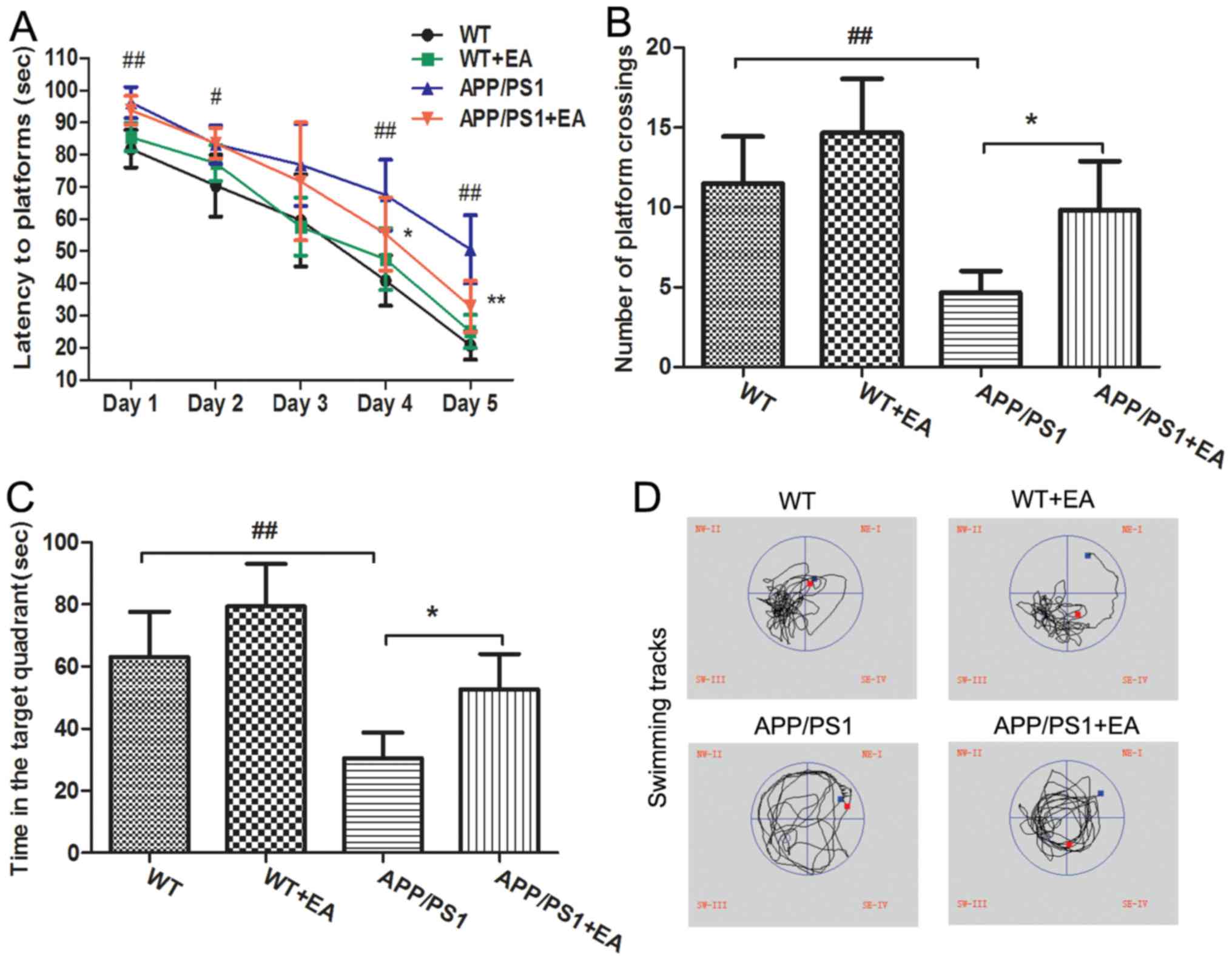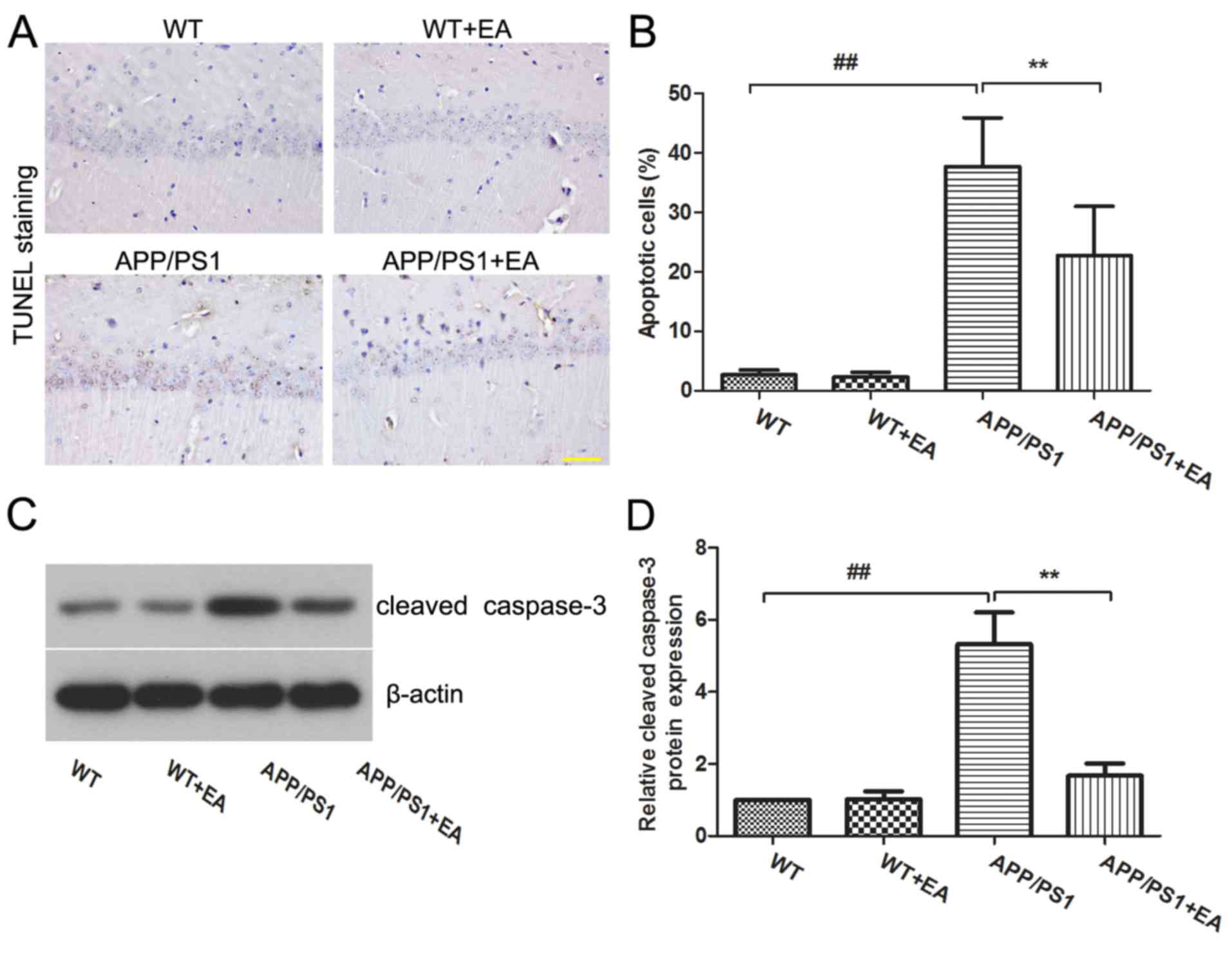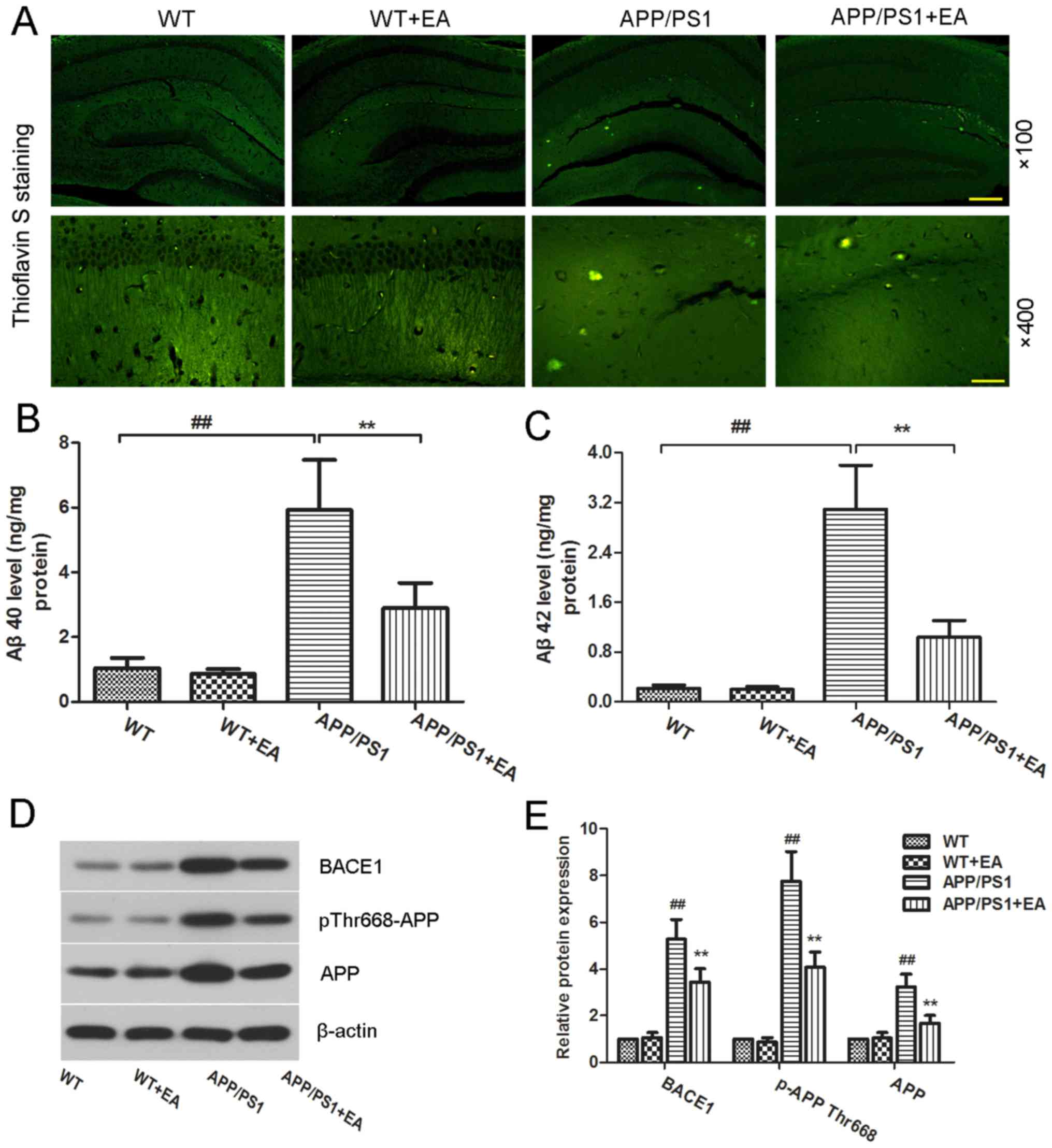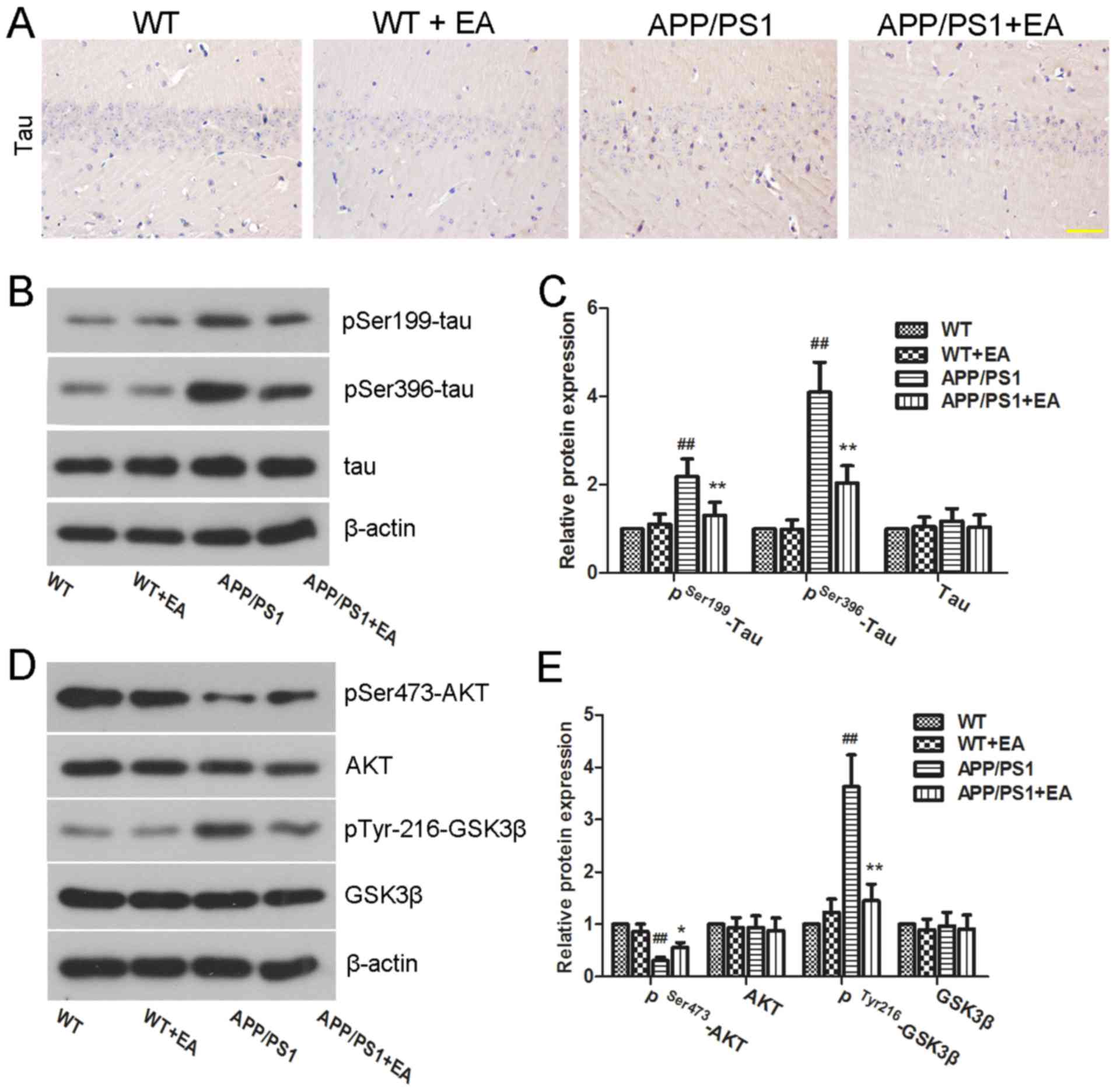|
1
|
Ballard C, Gauthier S, Corbett A, Brayne
C, Aarsland D and Jones E: Alzheimer's disease. Lancet.
377:1019–1031. 2011. View Article : Google Scholar : PubMed/NCBI
|
|
2
|
Selkoe DJ: Alzheimer's disease results
from the cerebral accumulation and cytotoxicity of amyloid
beta-protein. J Alzheimers Dis. 3:75–80. 2001. View Article : Google Scholar : PubMed/NCBI
|
|
3
|
Nelson PT, Braak H and Markesbery WR:
Neuropathology and cognitive impairment in Alzheimer disease: A
complex but coherent relationship. J Neuropathol Exp Neurol.
68:1–14. 2009. View Article : Google Scholar : PubMed/NCBI
|
|
4
|
Bloom GS: Amyloid-β and tau: The trigger
and bullet in Alzheimer disease pathogenesis. JAMA Neurol.
71:505–508. 2014. View Article : Google Scholar : PubMed/NCBI
|
|
5
|
Ruan YY, Zhai W, Shi XM, Zhang L and Hu
YL: Safflower yellow ameliorates cognition deficits and reduces tau
phosphorylation in APP/PS1 transgenic mice. Metab Brain Dis.
31:1133–1142. 2016. View Article : Google Scholar : PubMed/NCBI
|
|
6
|
Sobów T, Flirski M and Liberski PP:
Amyloid-beta and tau proteins as biochemical markers of Alzheimer's
disease. Acta Neurobiol Exp (Wars). 64:53–70. 2004.PubMed/NCBI
|
|
7
|
Sengupta U, Nilson AN and Kayed R: The
role of Amyloid-β oligomers in toxicity, propagation, and
immunotherapy. EBioMedicine. 6:42–49. 2016. View Article : Google Scholar : PubMed/NCBI
|
|
8
|
Zhang B, Li Q, Chu X, Sun S and Chen S:
Salidroside reduces tau hyperphosphorylation via up-regulating
GSK-3β phosphorylation in a tau transgenic Drosophila model of
Alzheimer's disease. Transl Neurodegener. 5:212016. View Article : Google Scholar : PubMed/NCBI
|
|
9
|
Amakura Y, Okada M, Tsuji S and Tonogai Y:
High-performance liquid chromatographic determination with
photodiode array detection of ellagic acid in fresh and processed
fruits. J Chromatogr A. 896:87–93. 2000. View Article : Google Scholar : PubMed/NCBI
|
|
10
|
Han DH, Lee MJ and Kim JH: Antioxidant and
apoptosis-inducing activities of ellagic acid. Anticancer Res.
26:3601–3606. 2006.PubMed/NCBI
|
|
11
|
Mansouri MT, Hemmati AA, Naghizadeh B,
Mard SA, Rezaie A and Ghorbanzadeh B: A study of the mechanisms
underlying the anti-inflammatory effect of ellagic acid in
carrageenan-induced paw edema in rats. Indian J Pharmacol.
47:292–298. 2015. View Article : Google Scholar : PubMed/NCBI
|
|
12
|
Ahmed T, Setzer WN, Nabavi SF, Orhan IE,
Braidy N, Sobarzo-Sanchez E and Nabavi SM: Insights into effects of
ellagic acid on the nervous system: A mini review. Curr Pharm Des.
22:1350–1360. 2016. View Article : Google Scholar : PubMed/NCBI
|
|
13
|
Farbood Y, Sarkaki A, Dianat M, Khodadadi
A, Haddad MK and Mashhadizadeh S: Ellagic acid prevents cognitive
and hippocampal long-term potentiation deficits and brain
inflammation in rat with traumatic brain injury. Life Sci.
124:120–127. 2015. View Article : Google Scholar : PubMed/NCBI
|
|
14
|
Sarkaki A, Farbood Y, Dolatshahi M,
Mansouri SM and Khodadadi A: Neuroprotective effects of ellagic
acid in a rat model of Parkinson's disease. Acta Med Iran.
54:494–502. 2016.PubMed/NCBI
|
|
15
|
Feng Y, Yang SG, Du XT, Zhang X, Sun XX,
Zhao M, Sun GY and Liu RT: Ellagic acid promotes Abeta42
fibrillization and inhibits Abeta42-induced neurotoxicity. Biochem
Biophys Res Commun. 390:1250–1254. 2009. View Article : Google Scholar : PubMed/NCBI
|
|
16
|
Kiasalari Z, Heydarifard R, Khalili M,
Afshin-Majd S, Baluchnejadmojarad T, Zahedi E, Sanaierad A and
Roghani M: Ellagic acid ameliorates learning and memory deficits in
a rat model of Alzheimer's disease: An exploration of underlying
mechanisms. Psychopharmacology (Berl). 234:1841–1852. 2017.
View Article : Google Scholar : PubMed/NCBI
|
|
17
|
Baluchnejadmojarad T, Rabiee N, Zabihnejad
S and Roghani M: Ellagic acid exerts protective effect in
intrastriatal 6-hydroxydopamine rat model of Parkinson's disease:
Possible involvement of ERbeta/Nrf2/HO-1 signaling. Brain Res.
1662:23–30. 2017. View Article : Google Scholar : PubMed/NCBI
|
|
18
|
Zhang ZX, Zhao RP, Wang DS and Wang AN:
Fuzhisan ameliorates Aβ production and tau phosphorylation in
hippocampal of 11 month old APP/PS1 transgenic mice: A Western blot
study. Exp Gerontol. 84:88–95. 2016. View Article : Google Scholar : PubMed/NCBI
|
|
19
|
Yoshiyama Y, Higuchi M, Zhang B, Huang SM,
Iwata N, Saido TC, Maeda J, Suhara T, Trojanowski JQ and Lee VM:
Synapse loss and microglial activation precede tangles in a P301S
tauopathy mouse model. Neuron. 53:337–351. 2007. View Article : Google Scholar : PubMed/NCBI
|
|
20
|
Ma J, Gao Y, Jiang L, Chao FL, Huang W,
Zhou CN, Tang W, Zhang L, Huang CX, Zhang Y, et al: Fluoxetine
attenuates the impairment of spatial learning ability and prevents
neuron loss in middle-aged APPswe/PSEN1dE9 double transgenic
Alzheimer's disease mice. Oncotarget. 8:27676–27692.
2017.PubMed/NCBI
|
|
21
|
Garcia-Alloza M, Robbins EM, Zhang-Nunes
SX, Purcell SM, Betensky RA, Raju S, Prada C, Greenberg SM, Bacskai
BJ and Frosch MP: Characterization of amyloid deposition in the
APPswe/PS1dE9 mouse model of Alzheimer disease. Neurobiol Dis.
24:516–524. 2006. View Article : Google Scholar : PubMed/NCBI
|
|
22
|
Niikura T, Tajima H and Kita Y: Neuronal
cell death in Alzheimer's disease and a neuroprotective factor,
humanin. Curr Neuropharmacol. 4:139–147. 2006. View Article : Google Scholar : PubMed/NCBI
|
|
23
|
Mucke L: Neuroscience: Alzheimer's
disease. Nature. 461:895–897. 2009. View
Article : Google Scholar : PubMed/NCBI
|
|
24
|
Jahn H: Memory loss in Alzheimer's
disease. Dialogues Clin Neurosci. 15:445–454. 2013.PubMed/NCBI
|
|
25
|
Lee MS, Kao SC, Lemere CA, Xia W, Tseng
HC, Zhou Y, Neve R, Ahlijanian MK and Tsai LH: APP processing is
regulated by cytoplasmic phosphorylation. J Cell Biol. 163:83–95.
2003. View Article : Google Scholar : PubMed/NCBI
|
|
26
|
Gandhi S, Refolo LM and Sambamurti K:
Amyloid precursor protein compartmentalization restricts
beta-amyloid production: Therapeutic targets based on BACE
compartmentalization. J Mol Neurosci. 24:137–143. 2004. View Article : Google Scholar : PubMed/NCBI
|
|
27
|
Kurt MA, Davies DC, Kidd M, Duff K and
Howlett DR: Hyperphosphorylated tau and paired helical
filament-like structures in the brains of mice carrying mutant
amyloid precursor protein and mutant presenilin-1 transgenes.
Neurobiol Dis. 14:89–97. 2003. View Article : Google Scholar : PubMed/NCBI
|
|
28
|
Cohen P and Frame S: The renaissance of
GSK3. Nat Rev Mol Cell Biol. 2:769–776. 2001. View Article : Google Scholar : PubMed/NCBI
|
|
29
|
Sabbagh M and Cummings J: Progressive
cholinergic decline in Alzheimer's disease: Consideration for
treatment with donepezil 23 mg in patients with moderate to severe
symptomatology. BMC Neurol. 11:212011. View Article : Google Scholar : PubMed/NCBI
|
|
30
|
Serrano-Pozo A, Frosch MP, Masliah E and
Hyman BT: Neuropathological alterations in Alzheimer disease. Cold
Spring Harbor Persp Med. 1:a0061892011.
|
|
31
|
Parthsarathy V, McClean PL, Hölscher C,
Taylor M, Tinker C, Jones G, Kolosov O, Salvati E, Gregori M,
Masserini M and Allsop D: A novel retro-inverso peptide inhibitor
reduces amyloid deposition, oxidation and inflammation and
stimulates neurogenesis in the APPswe/PS1DeltaE9 mouse model of
Alzheimer's disease. PLoS One. 8:e547692013. View Article : Google Scholar : PubMed/NCBI
|
|
32
|
Herran E, Perez-Gonzalez R, Igartua M,
Pedraz JL, Carro E and Hernandez RM: Enhanced Hippocampal
Neurogenesis in APP/Ps1 Mouse Model of Alzheimer's Disease After
Implantation of VEGF-loaded PLGA Nanospheres. Curr Alzheimer Res.
12:932–940. 2015. View Article : Google Scholar : PubMed/NCBI
|
|
33
|
Reiserer RS, Harrison FE, Syverud DC and
McDonald MP: Impaired spatial learning in the APPSwe + PSEN1DeltaE9
bigenic mouse model of Alzheimer's disease. Genes Brain Behav.
6:54–65. 2007. View Article : Google Scholar : PubMed/NCBI
|
|
34
|
Dionísio PA, Amaral JD, Ribeiro MF, Lo AC,
D'Hooge R and Rodrigues CM: Amyloid-β pathology is attenuated by
tauroursodeoxycholic acid treatment in APP/PS1 mice after disease
onset. Neurobiol Aging. 36:228–240. 2015. View Article : Google Scholar : PubMed/NCBI
|
|
35
|
Bao XQ, Li N, Wang T, Kong XC, Tai WJ, Sun
H and Zhang D: FLZ alleviates the memory deficits in transgenic
mouse model of Alzheimer's disease via decreasing beta-amyloid
production and tau hyperphosphorylation. PloS One. 8:e780332013.
View Article : Google Scholar : PubMed/NCBI
|
|
36
|
Li C, Guo XD, Lei M, Wu JY, Jin JZ, Shi
XF, Zhu ZY, Rukachaisirikul V, Hu LH, Wen TQ and Shen X: Thamnolia
vermicularis extract improves learning ability in APP/PS1
transgenic mice by ameliorating both Aβ and Tau pathologies. Acta
Pharmacol Sin. 38:9–28. 2017. View Article : Google Scholar : PubMed/NCBI
|
|
37
|
Chang KA, Kim HS, Ha TY, Ha JW, Shin KY,
Jeong YH, Lee JP, Park CH, Kim S, Baik TK and Suh YH:
Phosphorylation of amyloid precursor protein (APP) at Thr668
regulates the nuclear translocation of the APP intracellular domain
and induces neurodegeneration. Mol Cell Biol. 26:4327–4338. 2006.
View Article : Google Scholar : PubMed/NCBI
|
|
38
|
Taghavi F, Habibi-Rezaei M, Bohlooli M,
Farhadi M, Goodarzi M, Movaghati S, Maghami P, Taghibiglou C,
Amanlou M, Haertlé T and Moosavi-Movahedi AA: Antiamyloidogenic
effects of ellagic acid on human serum albumin fibril formation
induced by potassium sorbate and glucose. J Mol Recognit.
29:611–618. 2016. View Article : Google Scholar : PubMed/NCBI
|
|
39
|
Roberson ED, Scearce-Levie K, Palop JJ,
Yan F, Cheng IH, Wu T, Gerstein H, Yu GQ and Mucke L: Reducing
endogenous tau ameliorates amyloid beta-induced deficits in an
Alzheimer's disease mouse model. Science. 316:750–754. 2007.
View Article : Google Scholar : PubMed/NCBI
|
|
40
|
Iqbal K, Alonso Adel C, Chen S, Chohan MO,
El-Akkad E, Gong CX, Khatoon S, Li B, Liu F, Rahman A, et al: Tau
pathology in Alzheimer disease and other tauopathies. Biochim
Biophys Acta. 1739:198–210. 2005. View Article : Google Scholar : PubMed/NCBI
|
|
41
|
Ma Q, Ruan YY, Xu H, Shi XM, Wang ZX and
Hu YL: Safflower yellow reduces lipid peroxidation, neuropathology,
tau phosphorylation and ameliorates amyloid beta-induced impairment
of learning and memory in rats. Biomed Pharmacother. 76:153–164.
2015. View Article : Google Scholar : PubMed/NCBI
|
|
42
|
Maas T, Eidenmüller J and Brandt R:
Interaction of tau with the neural membrane cortex is regulated by
phosphorylation at sites that are modified in paired helical
filaments. J Biol Chem. 275:15733–15740. 2000. View Article : Google Scholar : PubMed/NCBI
|
|
43
|
Matsuoka Y, Gray AJ, Hirata-Fukae C,
Minami SS, Waterhouse EG, Mattson MP, LaFerla FM, Gozes I and Aisen
PS: Intranasal NAP administration reduces accumulation of amyloid
peptide and tau hyperphosphorylation in a transgenic mouse model of
Alzheimer's disease at early pathological stage. J Mol Neurosci.
31:165–170. 2007.PubMed/NCBI
|
|
44
|
Ryder J, Su Y and Ni B: Akt/GSK3beta
serine/threonine kinases: Evidence for a signalling pathway
mediated by familial Alzheimer's disease mutations. Cell Signal.
16:187–200. 2004. View Article : Google Scholar : PubMed/NCBI
|
|
45
|
Gassowska M, Czapski GA, Pajak B, Cieslik
M, Lenkiewicz AM and Adamczyk A: Extracellular α-synuclein leads to
microtubule destabilization via GSK-3β-dependent Tau
phosphorylation in PC12 cells. PloS One. 9:e942592014. View Article : Google Scholar : PubMed/NCBI
|


















